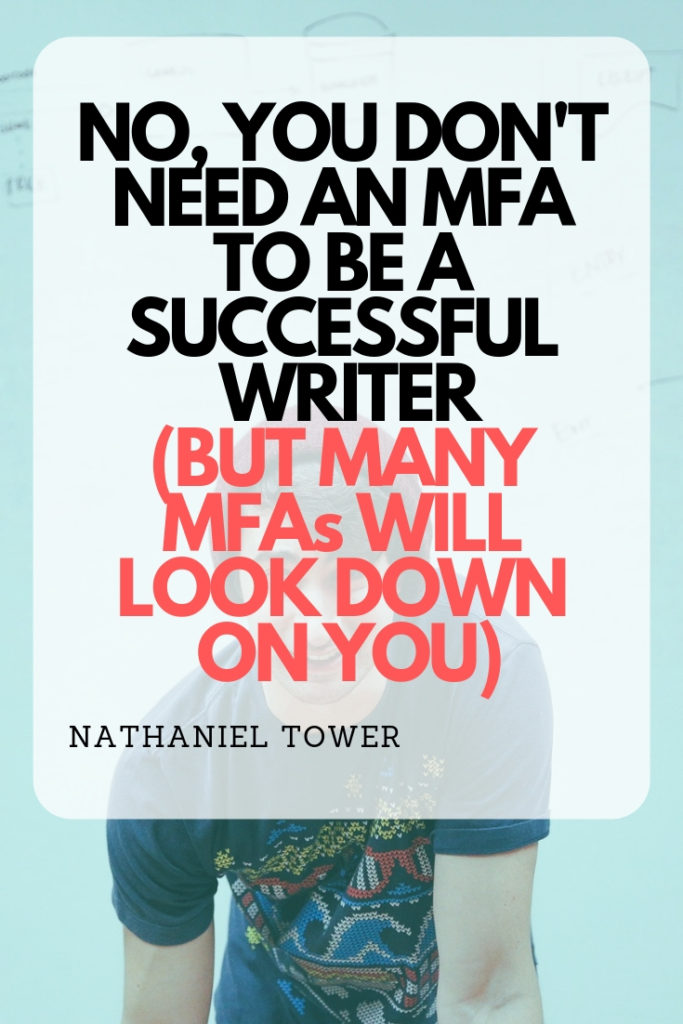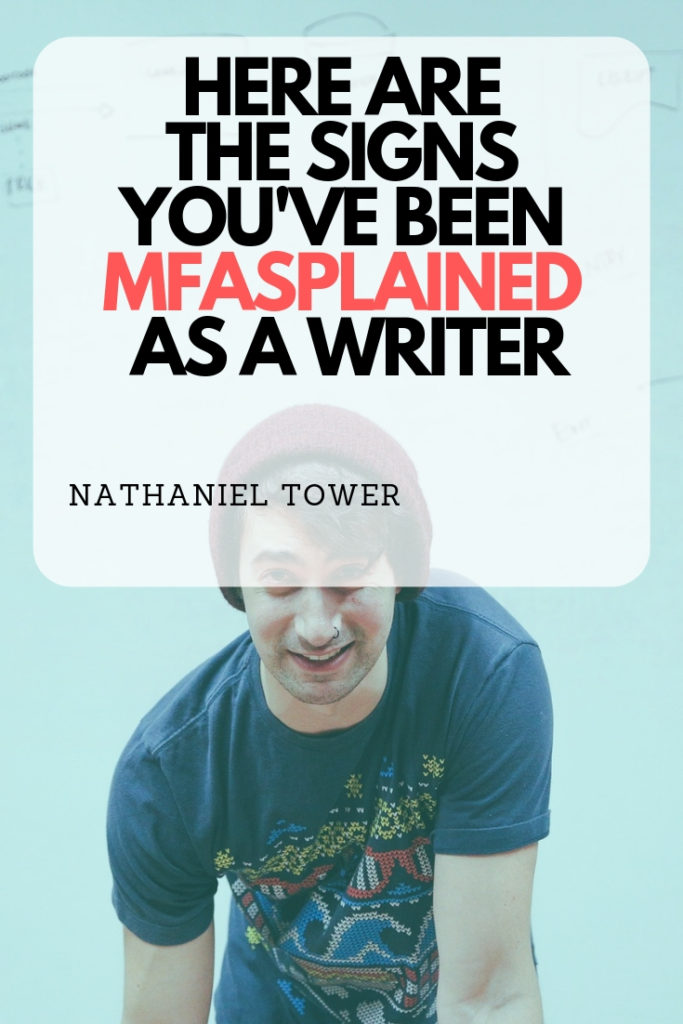Last Updated on February 8, 2019 by Nathaniel Tower
Most writers are good people, regardless of what their credentials are. I have a lot of friends who are writers. A fair number of them have an MFA in writing. They’re all awesome people and great writers. I also know a lot of people in the writing community who don’t have an MFA. Most of them are also awesome people and great writers, too. Point is this: you can be a great writer with or without an MFA. Whether or not you pursue one is based on your needs, your goals, and your desires.
However, every MFA program has one or two assholes who ruin it for everyone. They are the MFAsplainers, and they give MFAs the world over a bad name. This is their story…
Author’s Note: I thought long and hard before publishing this post, and I even shared this with a few of my MFA friends first. They told me it was hilarious and true, and they gave me their blessing to post it. So if any of the following offends you, then please blame them!
Meet the MFAsplainers
No matter how good of a writer you are, you’ll never be as good as someone with an MFA. You could be a master of words, sentence structure, and storytelling, but if you don’t have an MFA, you aren’t a real writer.
At least that’s what the MFAsplainers say. Not sure what an MFAsplainer is? Well, you can typically identify one based on these common mantras:
- “I’ve studied the right way to write, so I write the right way.”
- “Studying writing in a small group while getting paid a stipend that’s barely enough to rent half a studio apartment just outside downtown Wichita makes me a real writer.”
- “Since I have an MFA, everyone should want to publish everything I write, including the shitty writing exercises I did as an MFA.”
- “I’ve read all the most important works of literature, so I’m an amazing writer.”
You sure are. Amazing indeed. Except, here’s the thing…
Most MFAsplainers are actually not very good writers. Every lit mag editor in the universe can pick out an MFA story in the first sentence. They typically suffer from one of these four problems:
- They are entirely unoriginal and dull with no sense of life experience.
- They are formulaic save for some vague hint of experimentation that all MFAs are instructed to use.
- They use such over-the-top and flowery metaphors to try to disguise thin, contrived plots as being super literary.
- They have no concept of storytelling and instead read like throwaway writing prompts that every high school creative writing teacher uses at the beginning of class to kill time.
But MFAsplainers don’t see any of this. They think they are special because they are one of the chosen writers. They don’t realize that many good writers don’t pursue MFAs. So they assume that having an MFA makes them better writers. And then they do things like this:
- They recommend “amazing” pieces of literature that either:
- Everyone already read in high school
- Are so obscure that only an MFA would need to read
- They complain to editors when their submissions are rejected, often explaining (aka MFAsplaining) why their stories are better than everything that lit mag publishes.
- They post all kinds of boring details about their writing processes and daily word counts on social media.
- They start every conversation with, “Well, I have an MFA” and scoff at anyone who doesn’t have one.
Let’s talk about MFAsplaining a little more. If you’re a writer and you interact with others in any way on the internet, then you have been MFAsplained before. This happens anytime someone with an MFA explains something to you as if they are a superior writer simply because they have an MFA or are in the process of getting one (and sometimes even if they are in the process of applying for an MFA program).
Here are some common types of MFAsplaining that occur every day:
- Talking about which lit mags are the best. This type of banter is usually directed at lit mag editors and contains information that comes directly from generic blog posts that list the best lit mags to submit to.
- Detailed discussions about why premier lit mags really aren’t that good. This is usually directed at people who’ve been published in these top-tier lit mags. Of course, the MFAsplainer has not been published in any lit mag of similar caliber.
- Explaining how lit mags work. Once again, this is usually directed at lit mag editors and is the complete opposite of how lit mags actually work.
- Making comments about how real writers have MFAs, how all bestselling authors are terrible (even if they have MFAs), and how writers without MFAs should stop submitting their work (and possibly stop writing altogether).
- Ranting about what types of books people shouldn’t read. Occasionally, these rants will mention books people should read, but mostly they are just attacks on other writers.
MFAsplaining covers a broad range of topics and does not have to be limited to any of the above. Here are some undisputed facts that MFAsplainers will tell you about MFAs:
- MFAs have bigger and better book collections than non-MFAs
- MFAs are more well-read than non-MFAs
- MFAs are objectively better writers than non-MFAs
- MFAs deserve to be published every time they submit
- MFAs know everything there is to know about writing
Here’s the bottom line: if you don’t have an MFA, you are a second-tier writer at best. Hell, you don’t even deserve to have an opinion about writing. So quit whatever day job you have, even if it’s one where you are making ten times as much as an MFA stipend, and send your amazing portfolio of work to the top ten MFA programs in the country. And if you can only get into a third-rate program, you’ll still be able to sleep better knowing you will instantly become a better writer than everyone who hasn’t studied the art of writing under someone else who studied the art of writing.
A special thank you to the many writers with MFAs who treat other writers with dignity and respect. Please, when you see one of your fellow MFAs out there MFAsplaining, call them out on it. Don’t let them continue to give MFA programs a bad name.
Obviously there are many good reasons to get an MFA. This post is not meant to discourage you from seeking one. It’s merely meant to call attention to a problem within the writing community caused by a few bad apples.
Have you ever been MFAsplained? Share your experiences in the comments. And don’t forget to share this article on all your favorite platforms.


